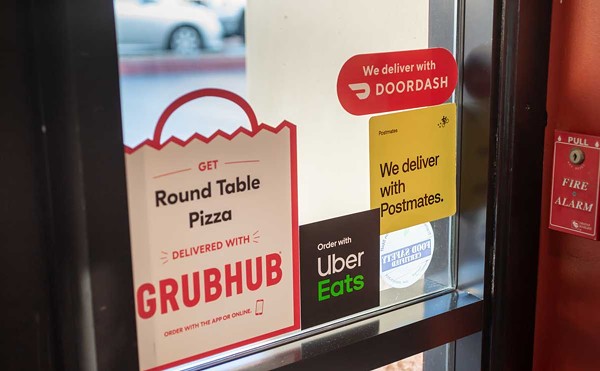Shopping in early spring, the only local foods that Patrick Crouch, field and greenhouse coordinator for Earth Works, can find at Eastern Market are rhubarb, local eggs, some meat and remnants of last year's harvest that people have held over the winter — cabbage, potatoes, apples. Spring rhubarb and asparagus won't arrive for another month, and Crouch will have to wait until late summer for the real Michigan bounty — strawberries, green beans, onions, apples and berries.
Even when Eastern Market disappoints him, in the five years he's been in Detroit, Crouch has seen fresh food options expand. "It's a serious improvement," he says, referring to the growing number of farmer's markets and farmers' who are interested in selling in Detroit, "but it's far from enough."
A lingering 'food desert'
The 2007 LaSalle Bank study, "Examining the Impact of Food Deserts on Public Health in Detroit" (aka the "Food Desert Study"), found what residents of Detroit already knew — it's hard to eat fresh in the city. "There are certain quadrants of the city that have food deserts," says Augie Fernandes, president of the Gleaners Community Food Bank. "Our neighbors in that area just don't have access to good fresh food."
Most of the 1,073 food stores in Detroit are "fringe locations" — party stores that sell more lottery tickets and cigarettes than fresh fruits and vegetables. More than 500,000 Detroit residents live in what could be termed "food deserts," and those residents are more likely to "suffer or die prematurely from diet-related disease than residents who live in areas with healthy food options," the report says.
"As a Detroiter," says Ashley Atkinson, with the Greening of Detroit, "you travel farther and pay more. And when you get [to the market], it's disappointing in terms of quality and the seasonality of the food available."
The problem in Detroit is more than huge grocery stores closing their doors, says Crouch, who'd says he'd like to see small, local markets take over from the likes of Kroger and Farmer Jack anyway.
"People are happy to buy salad mix from California, and they think they're doing something right if it's organic," he says. "Not enough people have been educated about the economic benefit to their area [of buying local food]." So, as the market lags behind forward-thinking "locivores" like Crouch, how are residents satisfying their taste for fresh fruits and veggies within city limits?
Finding the freshness
The Northwest Detroit Farmers' Market started in 2006 in the stately, tree-lined Grandmont Rosedale neighborhood. Every Thursday in July through October, residents walk, bike and drive to the market to shop at 12 to 15 vendors set up in the Bushnell Congregational Church parking lot. In season, the smells of fresh berries, crisp tomatoes and bunches of flowers floats through the air. People hover over loaves of freshly baked bread, choosing just the right one. Neighbors greet each other and chat as they pick a bottle of local honey to bring home.
When the Northwest Farmers' Market was started it was meant to be purist. "You have to grow or make whatever you sell at our market," explains Pam Weinstein, special projects coordinator for the Grandmont Rosedale Development Corporation. Weinstein points out that 80 percent of what's sold at Eastern Market isn't from Michigan. Though shoppers may be able to find oranges, bananas, and coconuts, they're not putting the money back into the local economy or supporting regional farmers.
But at Northwest, every penny spent goes back into Michigan. And, when it comes down to it, if you open up the market to farmers who ship their produce around the country, many local farmers can't compete.
And then there's the flavor — bite into a fresh tomato that was picked that morning and the first thing you'll notice is flavor. Weinstein says, "the locally grown tomato or apple tastes about 100 times better than the thing that's been trucked in.
So far, the Northwest Farmers' Market has been successful at bringing together people from the surrounding neighborhoods and vendors from around the region where it's hard to find local produce. When the farmers' market isn't open, Grandmont-Rosedale residents can shop at the local Metro Food Land, "but that's it," says Weinstein.
Building healthy communities
The 20 volunteers who work with Malik Yakini and the Detroit Black Community Food Security Network spend their time tending to two large gardens in Detroit. They clear debris from the land and make the soil tillable, then they plant, water, harvest and sell fresh fruits and vegetables. But DBCFSN isn't just about gardening; working with Councilperson JoAnn Watson, they recently advocated for a City of Detroit food security policy, which passed in March, and are working to set up a Food Policy Council that will determine exactly what the city needs in terms of food security, equity and accessibility.
Right now, says Yakini, "Detroiters aren't seeing the benefit in the food dollars that they spend." Instead of spending money to buy fresh produce grown within city limits, and seeing that money improve the local economy, Detroiters buy food that's brought in from outside city limits, from sellers who take that economic benefit elsewhere. "The main thing we try to do is change people's consciousness about food," says Yakini, "where it comes from and who controls it." Where most of the people in Detroit consider themselves consumers, Yakini and DBCFSN are working to expand that view with everything from building food co-ops to starting a fleet of mobile produce trucks. Yakini's starting goal is modest. He thinks Detroiters can grow 10 to 25 percent of their food within city limits, though he admits that's not as easy as it looks. "It's not a simple problem, and there are no simple solutions," he says.
From the ground up
Farmers' markets are a good start, but Crouch thinks community gardeners will have the biggest impact on fresh food in the city. Gardens, he insists, will improve access to fresh produce while fostering sustainable communities.
"In a lot of ways, in these blighted communities, people don't know each other anymore. Gardens are a common space where people are out, beautifying the neighborhood and acting as the eyes and ears of the community."
Earth Works, part of the Capuchin Soup Kitchen, has a 1.5 acre garden plot that they use in the soup kitchen, and they work with the Garden Resource Program (a collaboration between Earth Works, the Greening of Detroit, Michigan State University, and the Detroit Agriculture Network) to teach people about food deserts and to help residents start community gardens. Right now more than 600 gardeners plant 41 different fruits and vegetables in plots across the city. In 2007, Garden Resource Program gardeners grew 120 tons of food that was eaten by 5,500 people. "Urban agriculture definitely increases access to healthy food," says Ashley Atkinson, with the Greening of Detroit, but "it's not all about food." It's also about people connecting through food.
Once people are out in those gardens, they're talking, connecting and adding nutrition to their dinner plates. Crouch observes, "Gardening is something that crosses socioeconomic barriers that not a lot of other things do."
What's more, Detroit's surplus of ecologically compromised "brownfield" lots could be a new kind of urban asset — gardens just waiting to happen. Detroit could end up ahead of the game.
"We're running out of green fields," says Atkinson, "in the future all food will have to be grown on previously used land."
But there's a way to get farm-fresh produce throughout Michigan's growing season, and it doesn't involve so much as picking up a trowel. Michelle Lutz, farmer at Maple Creek Farm in rural Yale, encourages people to enter into what she calls a "shared-risk relationship" each year. Husband-and-wife team Michelle and Dan Lutz grow produce and deliver it throughout the 20-week growing season to restaurants, grocery stores and individuals. Members of the Lutz's Community Supported Agriculture (CSA) group pay up-front, which means that they reap the benefits of a good year, or suffer the losses of a bad one. In the years since they opened in 1995, Lutz has seen an increase in membership from 13 to 500.
CSAs have caught on in other states, but are just starting to catch on in Michigan. "We have to stop being so comfortable with global food," says Lutz. "If a vegetable had to get on a plane to get here, how good can it be? And, as the economy continues its decline, if everybody spent $10 on Michigan products each week, we'd put $36 million back into the economy each week."
As the economy continues to suffer, more people are reaching out to Gleaners Community Food Bank, the oldest and largest food bank in Michigan. Gleaners currently distributes 25 million meals through social service agencies, rural food pantries and partners around the city. In all, the food bank feeds more than 450,000 people annually. Most of the food they deliver is pantry-staple food that will last awhile either in the cupboard or freezer. They also distribute local Michigan produce or other vegetables and fruits when they get shipments from local farmers, from the southwest Detroit's produce terminal, and from crops in their own organic garden. "The more we can help sustain ourselves, the better off we are," says Fernandes.
In the long run, Crouch would like to see more local markets carry fresh fruits and vegetables — to see milk, eggs, apples and lettuce on a shelf next to the beer and bologna. And Atkinson adds that you can whip up a good meal without leaving city limits, as her pantry includes fresh baked goods from Avalon International Breads on West Willis, and fruits and vegetables from Eastern Market's R. Hirt and the supermercado in her Mexicantown neighborhood.
And, yes, you can still have some Cabana chips on the side.
The Akwaaba Community Center is at 8045 Second Ave., Detroit. Stop by 11 a.m.-7 p.m. Fridays to sample and buy fresh meals made by raw-food preparers and macrobiotic chefs.
Maple Farms CSA can be reached at www.maplecreekfarm.com; see www.localharvest.org to find other area CSAs.
Earth Works can be reached at www.earthworks.org or 313-579-2100. The Greening of Detroit can be reached at www.detroitagriculture.org or 313-237-8736.
The Northwest Farmers’ Market starts in July and runs 4-8 p.m. Thursday afternoons at Bushnell Congregational Church. See www.grdc.org for more information.





